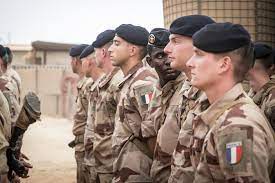APA-Niamey (Niger) – Is this the end of the protracted tug-of-war between Paris and Niamey?
Following the July 26 ouster of President Mohamed Bazoum, the authorities had demanded the withdrawal of French troops and ordered the expulsion of Ambassador Sylvain Itté who had refused to budge to the new military junta in charge in Niamey.
In an interview with the French media TF1 and France 2 on Sunday, Emmanuel Macron announced the return of Ambassador Sylvain Itté, who had been expelled and denied a visa by the new Nigerien authorities for several days against the backdrop of a diplomatic row between the two countries.
“I told (deposed president) Bazoum. France has decided to recall its ambassador. In the next few hours, our ambassador and several diplomats will return to France,” the French president declared, announcing the end of “military cooperation with the de facto authorities of Niger.” “Because they no longer want to fight terrorism,” explained the French head of state, recalling that France “is not there to take part in coups or to interfere.”
The National Council for the Protection of the Homeland (CNSP), which took power on July 26 after the ousting of Mohamed Bazoum, denounced the defense agreements with France. As a result, the ruling military asked the French troops to leave Niger. They had until Saturday, September 3, to comply. But Paris refused to meet the demands of the new Nigerien authorities, arguing that they were not legitimate.
Since then, tensions between the two capitals have escalated. Niamey gave the French ambassador, Sylvain Itté, 48 hours to pack his bags. Addressing the ambassadors, Emmanuel Macron asked the French diplomat to stay, insisting on the need for Paris to be firm with the rebels, considered “Niger’s only problems.” He repeated this on Sunday. “I tell you, the rebels are friends of disorder. As I speak, there have been more deaths linked to Islamist terrorism since the start of the coup than in the previous 18 months,” he lamented.
Emmanuel Macron, who is now in favor of the withdrawal of French troops from Nigerien soil as part of the reorganization of Operation Barkhane, assured us that this would be organized over time. “We will consult with the rebels because we want it to happen calmly, by the end of the year,” he added.
However, Emmanuel Macron did not specify whether his country’s position on the military intervention by the Economic Community of West African States (ECOWAS) had changed.
Paris had already pledged its support for the regional institution’s diplomatic and military solutions. In an interview with France 24 and RFI, Senegalese President Macky Sall spoke of behind-the-scenes talks between Bola Tinubu, the current president of ECOWAS, and the Niger coup leaders, suggesting that a diplomatic solution was preferable. “The military option can only be taken after all other avenues have been exhausted,” the Senegalese leader said. Meanwhile, Washington has reached an agreement with Niamey to continue its military activities in Niger.
AC/lb/abj/APA


